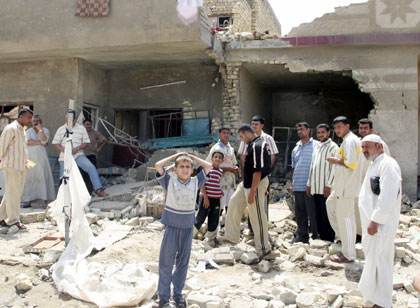BAGHDAD - Car bombs killed 30 people in Iraq on Sunday and wounded more
than 70 in one of the bloodiest spasms of violence of recent weeks as political
leaders closed in on a deal to form a national unity government.
The southern city of Basra was largely calm as British military engineers
examined the wreck of a helicopter whose apparent shooting down was followed by
clashes between troops and youths chanting triumphal Shi'ite militia slogans.

Iraqis stand outside a
house damaged by a rocket attack in Baghdad May 6, 2006. Two children ages
5 and 6 were killed and three adult civilians were wounded when a mortar
round landed on Baghdad's western district of Shula on Saturday, police
said. [Reuters] |
Twenty-one people were
killed and 52 wounded when a car bomb went off close to the main central bus
station in the Shi'ite holy city of Kerbala, 110 km (70 miles) south of Baghdad,
police said. Around the same time, two cars exploded in the capital.
A suicide car bomber hit an Iraqi army patrol in the mainly Sunni northern
district of Aadhamiya, killing eight people and wounding 15. Soldiers and
civilians were among the casualties.
Iraqi and U.S. forces conducted a sweep for rebels in Aadhamiya on Saturday,
the U.S. military said. The area is a stronghold of Sunni Arab insurgents.
A second car bomb exploded at a busy traffic intersection in northern
Baghdad, killing one civilian and wounding five. The target was not clear.
Interior Ministry sources said 42 bodies had been found in the last 24 hours
in the capital alone, including eight found dumped near Kindi hospital in
central Baghdad. The figure is in line with levels of violence seen in recent
months.
Sectarian violence sparked by the February 22 bombing of a major Shi'ite
shrine in Samarra has led to the discoveries of bodies -- many showing signs of
torture -- on a frequent basis.
Sunni leaders blame pro-government Shi'ite militias and the Shi'ite-dominated
police for some of the killing. Militia leaders speak of a need to respond to
three years of violence by insurgents from the once dominant Sunni minority.
Sectarian bloodshed has prompted warnings Iraq is sliding toward civil war
and added urgency to efforts by political leaders to form a unity government
that can reverse the trend.
GOVERNMENT TALKS
Nuri al-Maliki, the Shi'ite Islamist nominated as prime minister two weeks
ago after months of stalemate following a December election, says he expects to
name a cabinet shortly.
Representatives of the majority Shi'ites, Kurds, Sunnis and others were
meeting again on Sunday. On Saturday, the Shi'ite vice president said he
expected a deal "in the next few days."
The U.S. military said last week that Sunni Islamist hardliners around al
Qaeda figurehead Abu Musab al-Zarqawi were stepping up violence around Baghdad,
aimed at derailing the efforts to forge a consensus government.
Zarqawi has in the past declared war on Shi'ites, who were oppressed under
Saddam Hussein. Attacks in Kerbala and other Shi'ite centers have been
characterized by some Iraqi leaders as attempts to provoke Shi'ite militias into
all-out warfare.
Youths chanting slogans in favor of the Mehdi Army militia of anti-occupation
Shi'ite cleric Moqtada al-Sadr threw rocks and petrol bombs at British troops
cordoning of the crash site in Basra on Saturday where the military helicopter
came down.
After a curfew and with a heavy presence of Iraqi police and troops, Iraq's
southern second city was calmer on Sunday after the violence in which a health
official said five Iraqis died.
Several British troops were killed in the helicopter. Iraqi firefighters
reported finding four bodies. The British forces declined to say how many died
or describe the aircraft or how it came down on a house. Iraqi police said it
was shot down.
"The engineers and people investigating the crash are still working," British
spokesman Major Sebastian Muntz said, adding that the forces hoped to remove the
wreckage later in the day.
Troops were continuing to maintain a security cordon around the crash site,
in the city center close to the provincial governor's offices. Iraqi troops and
police maintained a heavy presence throughout the city after an overnight
curfew.
A local health service official said five Iraqis were killed and 42 wounded
in violence after the crash. Some casualties were caused by mortar fire in the
area, witnesses said.
British troops fired plastic bullets and, they said, also three live rounds.
Iraqi President Jalal Talabani wrote to British Prime Minister Tony Blair to
express his condolences, describing the deaths of those on the helicopter as a
"vile crime."